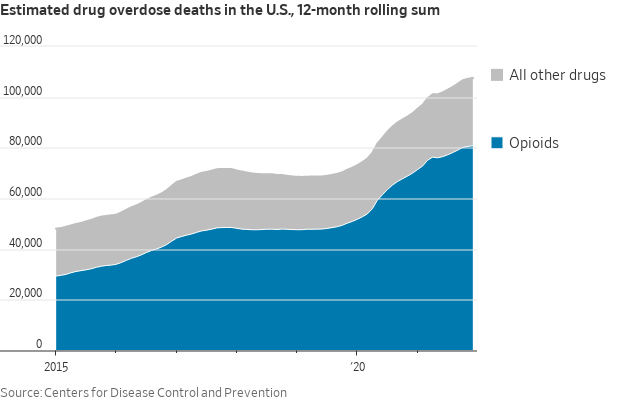WASDE: Focus on South American Crops, Grain Flow from Ukraine & Russia, and U.S. Winter Wheat

China buys more U.S. corn | EWG says crop insurance needs reformed | FTC update
|
In Today’s Digital Newspaper |
U.S. intelligence officials warned that Moscow was preparing for a protracted war. Avril Haines, the U.S. director of national intelligence, says President Vladimir Putin’s ambitions extend further: he also wants a land corridor to link his conquests to Transnistria, a Russian-controlled breakaway bit of Moldova that borders western Ukraine. Ukraine’s government has raised its ambitions from mere survival to the recovery of all Ukrainian territory, including lands lost to Russia in 2014, such as Crimea. Meanwhile, Russian-backed officials in the occupied region of Kherson in southern Ukraine said they would ask to join Russia.
The president and prime minister of Finland announced that the country will apply for NATO membership. Finland joining the alliance will mean that its border with Russia doubles at a stroke. Sweden is also considering joining. Vladimir Putin is vehemently opposed to NATO expansion, which he says threatens Russia.
Producer prices rose 11% on a 12-month basis in April, its fifth consecutive double-digit gain, easing from an upwardly revised 11.5% increase the prior month. The March gain was the highest since records began in 2010.
Saudi Aramco became the world’s most valuable company, surpassing Apple. As tech stocks lost value in recent days, the state-backed energy group Saudi Aramco, the world’s biggest crude exporter, took the top spot, lifted by rallying oil prices. Apple’s share price yesterday was at its lowest since November, with supply shortages and lockdowns in China weighing on the company’s outlook.
Key USDA reports are released at noon ET. We have some Pro Farmer analysis below. Traders say of interest will be where USDA places South American crops and their thoughts on grain flow from Ukraine and Russia. The U.S. winter wheat crop estimate will be released.
Private exporters reported sales of 612,000 metric tons of corn for delivery to China. Of the total, 68,000 metric tons is for delivery during the 2021-2022 marketing year and 544,000 metric tons is for delivery during the 2022-2023 marketing year.
Sorghum sales main activity in most recent week relative to U.S. export sales to China. Data for the week ended May 5 indicated little U.S. ag export sales activity for China. Activity for the week for 2021-22 included cancellations of 11,803 tonnes of corn, net sales of 80,773 tonnes of sorghum, net sales of 5,228 tonnes of soybeans, and net reductions of 3,255 running bales of upland cotton. No activity was reported for the 2022-23 marketing year. For 2022, net sales of 856 tonnes of beef and 4,682 tonnes of pork were reported.
President Biden and USDA Sec. Tom Vilsack on Wednesday visited a farm in Illinois, where the president spoke about how the Russian invasion of Ukraine is raising food prices and how U.S. farmers can help alleviate global food shortages, in part by doubling up on some crops. We have details in Policy section.
Alert: Texas A&M will soon release its updated report on fertilizer prices, which is expected to shower great price rises than the initial analysis.
Meatless profits. In premarket trading, Beyond Meat plunged more than 25% after the meat-alternative company reported a wider-than-expected loss in the last quarter due to higher spending.
The Senate confirmed economist Philip Jefferson as a Federal Reserve governor on Wednesday, adding a third nominee of Biden’s to the central bank’s board. The vote was 91 to 7. Senate Democrats announced Wednesday night that they expect to vote this afternoon to confirm Jerome Powell to a second term as Fed chair. We have an update on several other personnel developments in the Personnel section.
Meat packers watch out: Senate confirmed Alvaro Bedoya to serve on the Federal Trade Commission by a 51-50 margin, with Vice President Kamala Harris casting the tie-breaking vote after a party-line vote. Bedoya's confirmation gives Democrats a 3-2 majority on the FTC and the ability to act on Chair Lina Khan's aggressive agenda in areas like antitrust and consumer protection. She is likely to pursue an aggressive effort to limit corporate power.
The U.S. federal government’s budget deficit has shrunk by some $1.57 trillion so far this fiscal year, driven by record receipts from a strong economy and a slowdown in spending as pandemic-era programs fade.
Senate voted 51-49 against advancing a bill that would preserve abortion rights should the Supreme Court overturn Roe v Wade. Joe Manchin, the conservative Democrat from West Virginia who has said that he is “pro-life and proud of it,” voted with the Republicans.
After going the duration of the pandemic without reporting a case of Covid-19, North Korean state media announced the country’s first infections. North Korea has no known vaccination program.
Drug overdoses in the U.S. were deadlier than ever in 2021, according to provisional data from the CDC. Nearly 108,000 people died of drug overdoses last year, and about two-thirds of those deaths involved fentanyl or another synthetic opioid.
|
MARKET FOCUS |
Equities today: Global stock markets were mostly lower overnight. U.S. Dow opened around 150 points lower. Walt Disney dropped 5% premarket after the media giant said growth in the second half of the year may not be as fast as previously expected. In Asia, most major benchmarks declined. Hong Kong’s Hang Seng Index dropped 2.2% and Japan’s Nikkei 225 fell 1.8%.
U.S. equities yesterday: The Dow ended down 326.63 points, 1.02%, at 31,834.11. The Nasdaq lost 373.44 points, 3.18%, at 11,364.24. The S&P 500 was down 65.87 points, 1.65%, at 3,935.18
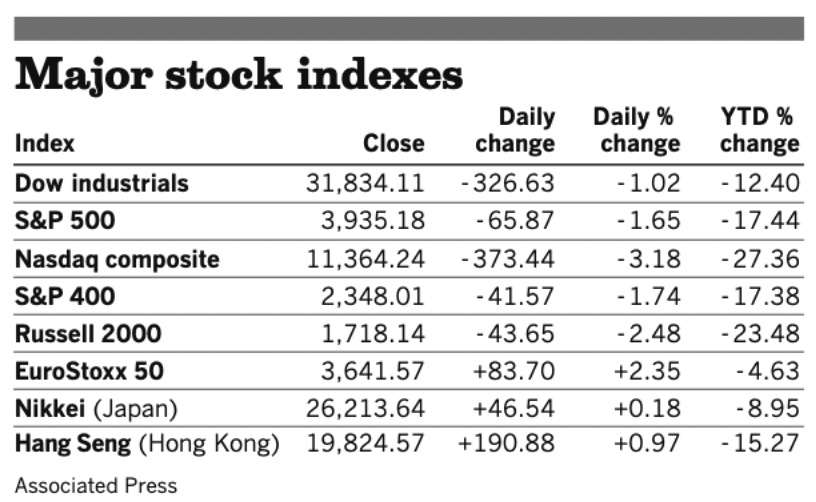
Agriculture markets yesterday:
- Corn: July corn futures rose 13 1/4 cents to $7.88 1/2, the contract’s highest closing price since May 5. December corn gained 16 3/4 cents to $7.35 3/4.
- Soy complex: July soybeans rose 14 1/2 cents to $16.06 3/4. July soybean meal fell $3.60 to $397.90, a 3 1/2-month closing low. July soyoil rose 241 points at 83.45 cents per pound.
- Wheat: July SRW wheat rose 20 1/4 cents to $11.13, the contract’s highest settlement since April 18. July HRW wheat rose 25 1/2 cents to $12.00 1/2, the highest close since March 7. July spring wheat rallied 42 1/2 cents to $12.56, a lifetime-high close for the contract.
- Cotton: July cotton gained 66 points to 143.60 cents per pound, while December advanced 58 points to 124.75 cents.
- Cattle: June live cattle June live cattle gained $1.175 to $133.575. August feeder cattle fell $1.85 to $170.00. Wholesale beef prices continue to languish around eight-week lows.
- Hogs: June lean hogs fell 72.5 cents to $100.85, the contract’s lowest closing price since Jan. 18.
Ag markets today: Soybeans and wheat pulled back from Wednesday’s gains, while corn was mostly firmer overnight. Trade was quiet as traders await USDA’s May crop reports later this morning. As of 7:30 a.m. CT, corn futures were trading 2 to 3 cents higher, soybeans were 5 to 7 cents lower, winter wheat futures were 2 to 4 cents lower and spring wheat was around 2 cents lower. Front-month U.S. crude oil futures were around $1.00 lower and the U.S. dollar index was about 650 points higher.
Technical and other viewpoints from Jim Wyckoff: “Risk aversion remains elevated amid the Russia/Ukraine war that shows no signs of ending, Covid lockdowns in China and problematic price inflation that is gripping the globe. Traders worry the U.S. and other major economies will slip into recession in the coming months, due to the aforementioned factors.”
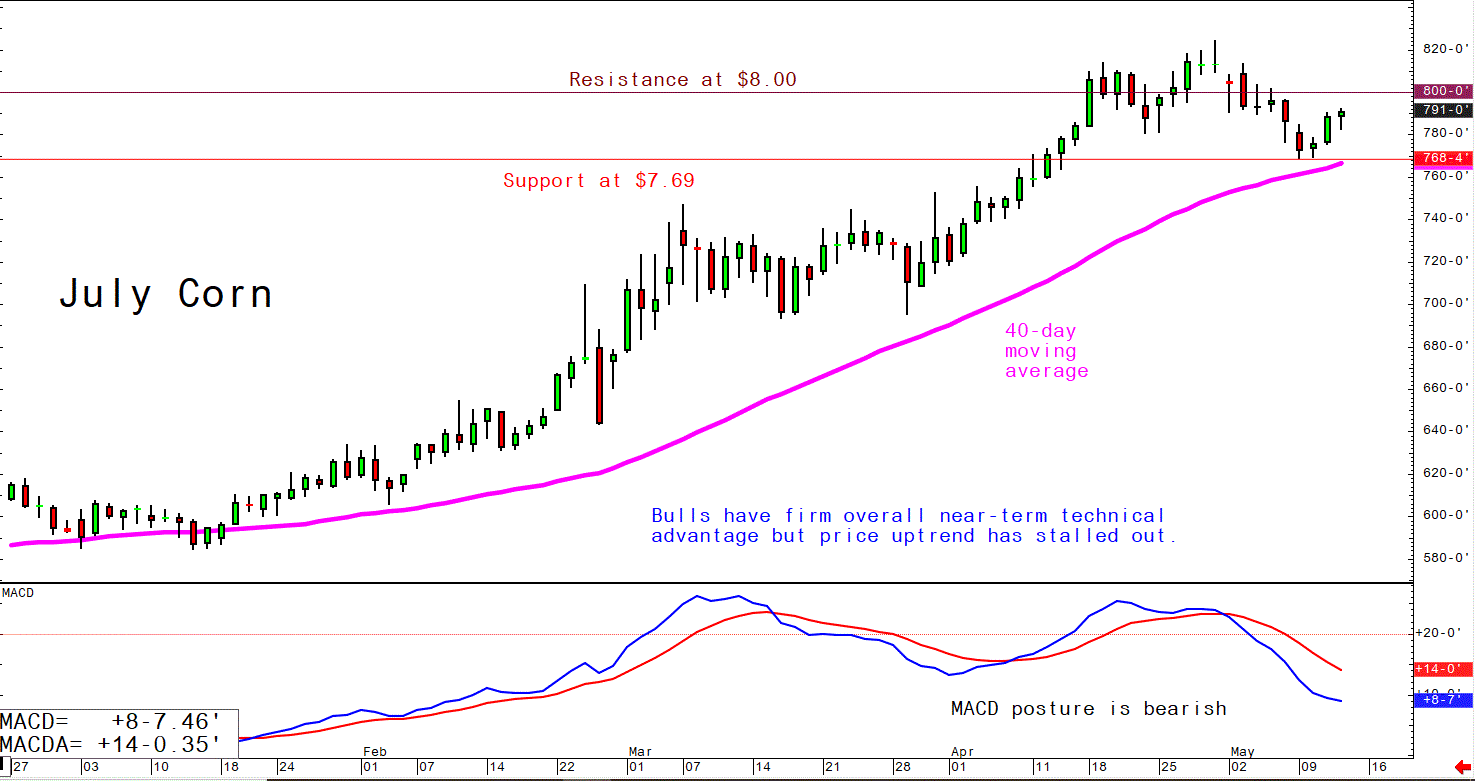
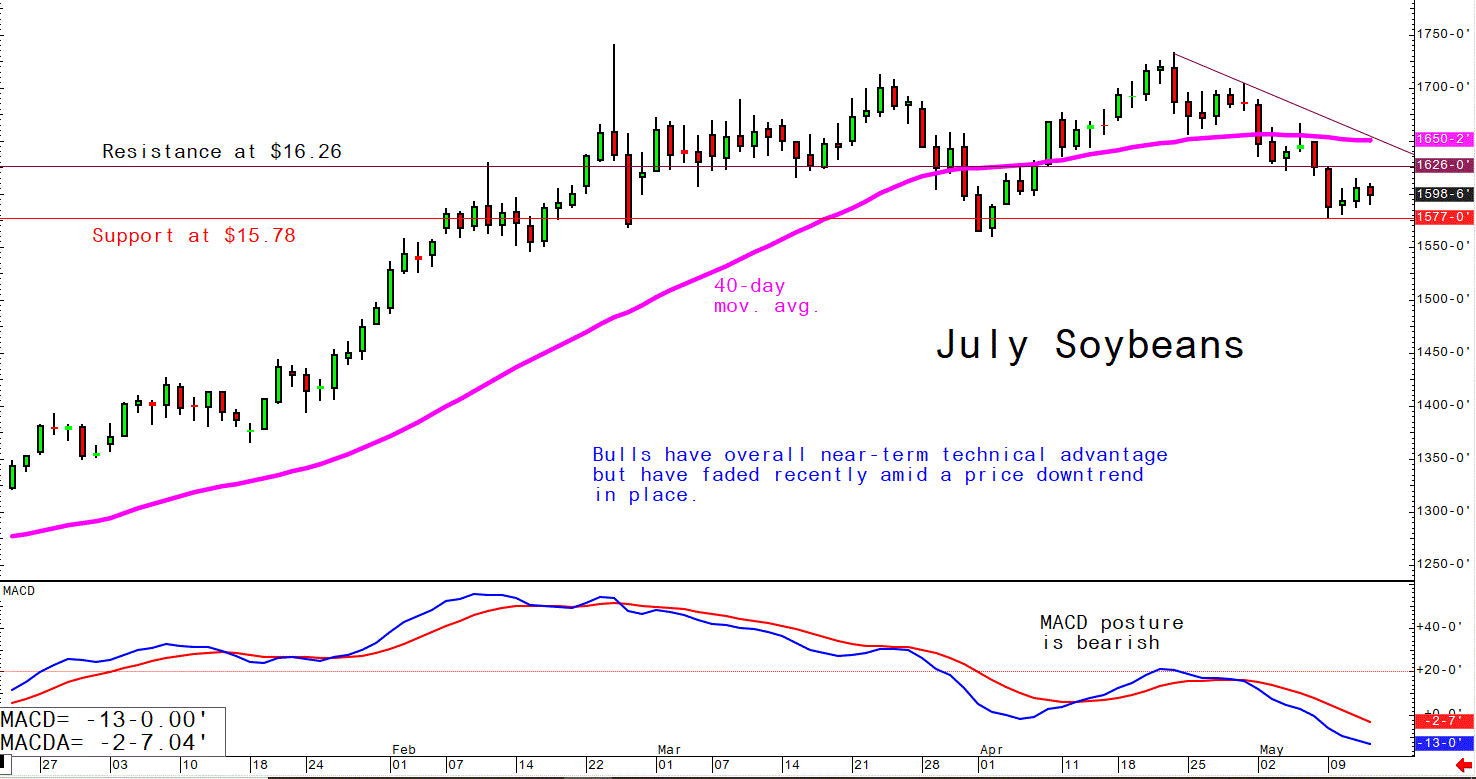
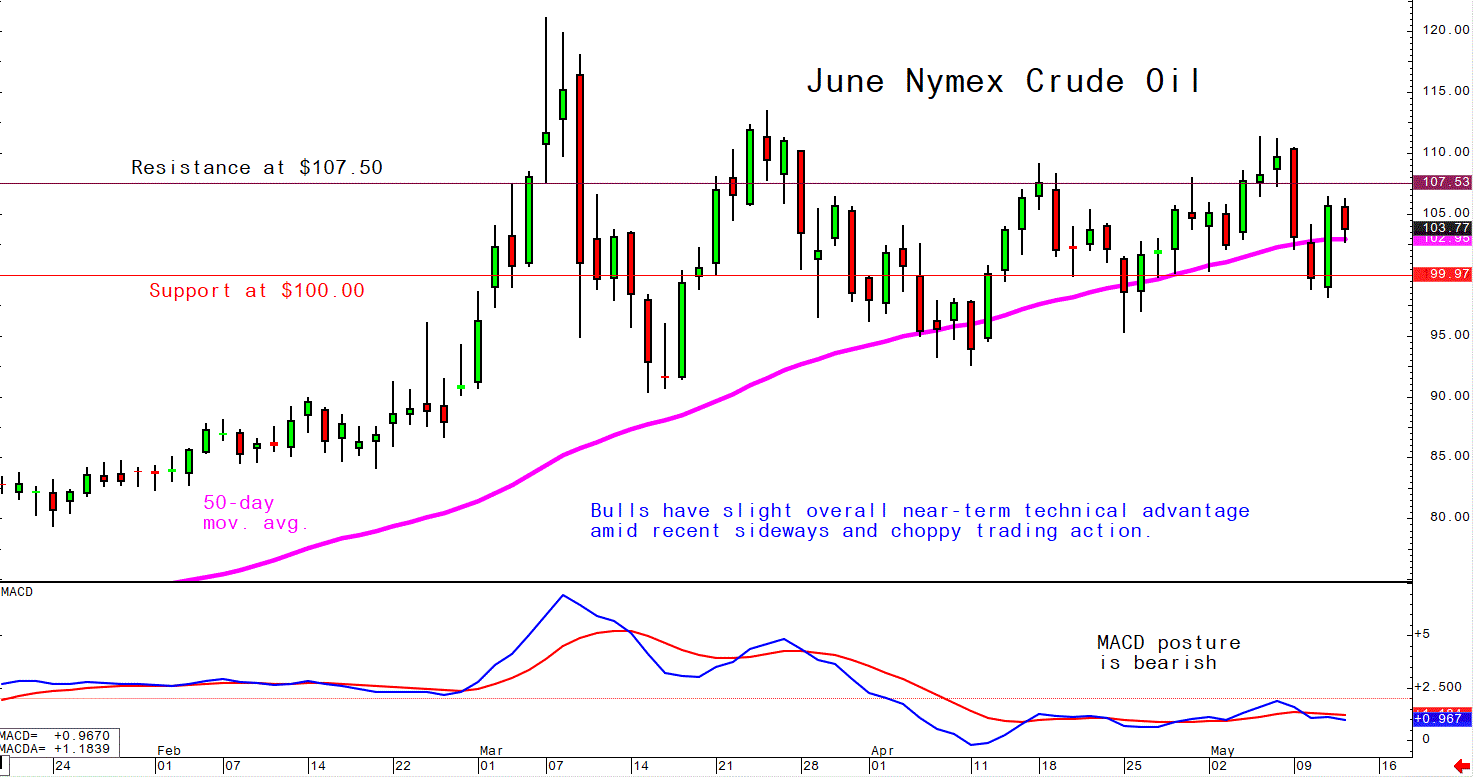
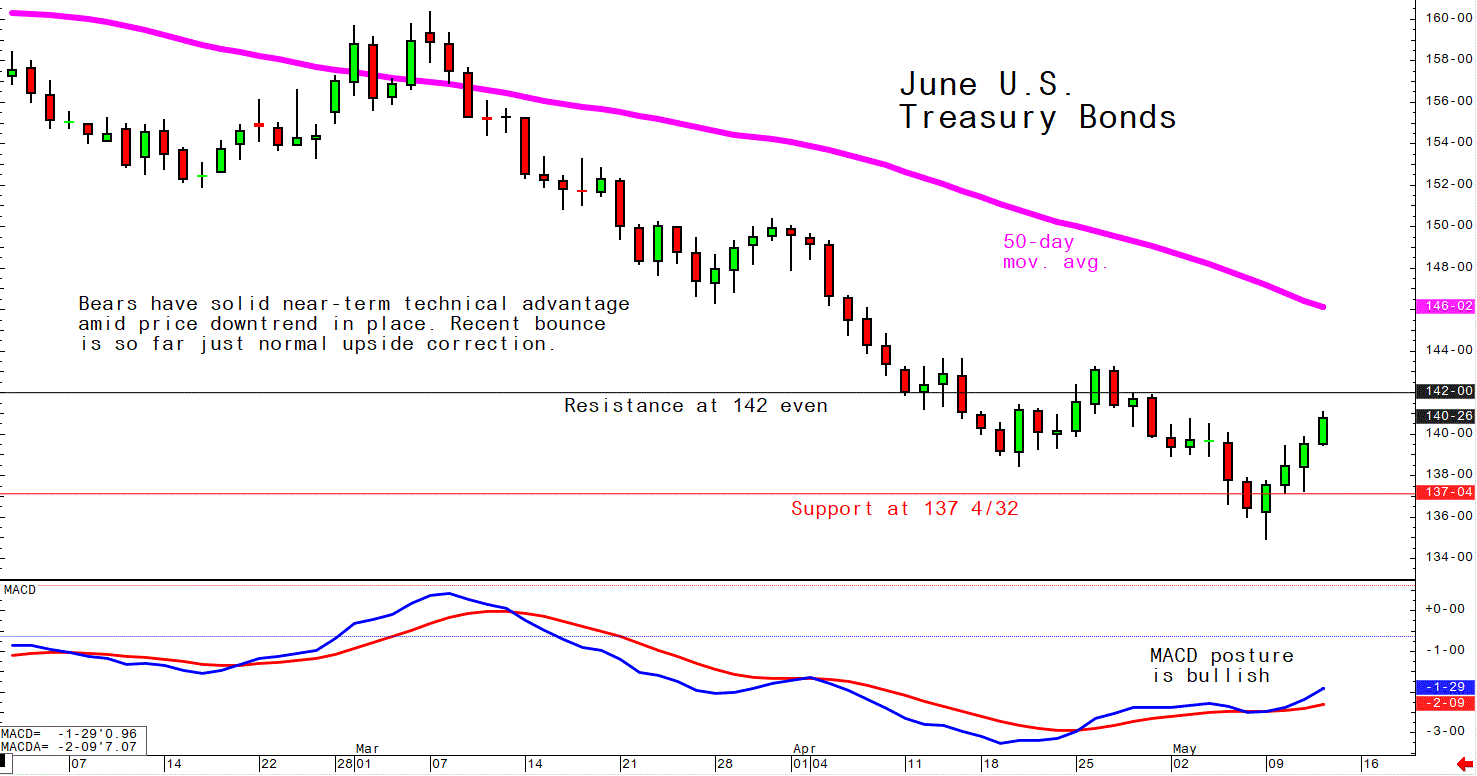
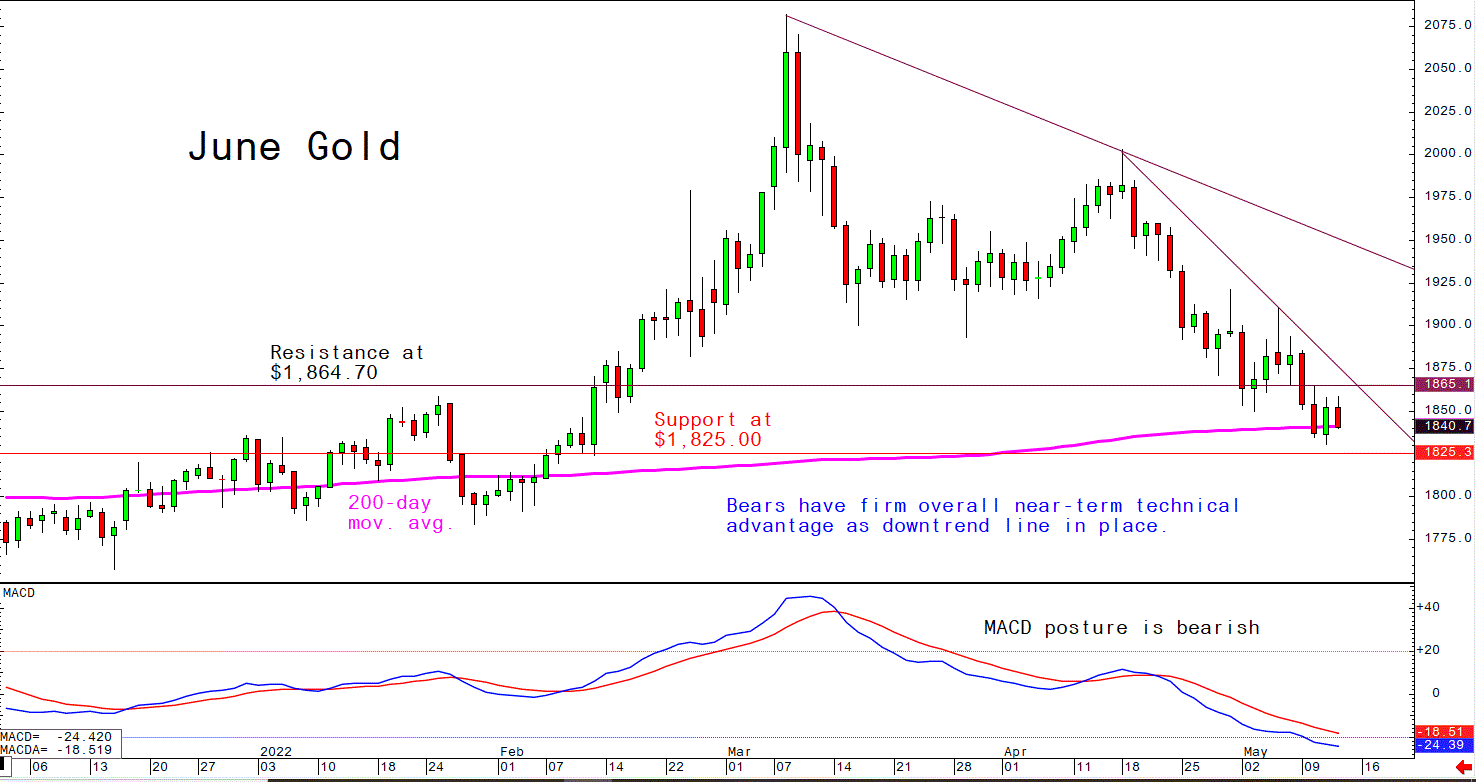
On tap today:
• U.S. jobless claims are expected to fall to 194,000 in the week ended May 7 from 200,000 one week earlier. (8:30 a.m. ET)
• U.S. producer price index for April is expected to increase 0.5% from one month earlier. (8:30 a.m. ET) UPDATE: The Labor Department said the PPI, which generally reflects supply conditions in the economy, increased a seasonally adjusted 0.5% in April from the prior month. That marks a deceleration from the upwardly revised 1.6% gain in March. April’s rate of increase was the lowest since September 2021, but was higher than the average monthly gain of 0.2% in the two years before the pandemic. Producer prices rose 11% on a 12-month basis in April, its fifth consecutive double-digit gain, easing from an upwardly revised 11.5% increase the prior month. The March gain was the highest since records began in 2010.
• USDA Weekly Export Sales report, 8:30 a.m. ET.
• WASDE and Crop Production reports from USDA, noon ET.
• President Biden will host the leaders of the Association of Southeast Asian Nations (ASEAN) today and tomorrow for a special summit. It follows the October 2021 summit where Biden committed $102 million to address “Covid-19 recovery, the climate crisis, economic growth and gender equality.”
May USDA crop reports out at noon ET. From Pro Farmer:
“USDA’s May 12 Supply & Demand Report at noon ET will be the first official release of balance sheets for 2022-23, which will incorporate March planting intentions. The big question with corn is whether USDA lowers its yield from trendline to reflect the slow planting pace as of early May — something that has happened only five years in the past, with 2013 being the most recent. Globally, focus will be on how much more “Ukraine factor” is added to the old-crop grain and oilseed balance sheets and the new-crop assumptions for both Ukraine and Russia. There are also major uncertainties with what USDA will do with harvested acres and yield in its first U.S. winter wheat crop estimate. Traders’ significant uncertainties about what the data will show is evident in the wide range of pre-report estimates.”
How unhappy are Americans about inflation? Consider this from the New York Times: “Americans are unhappy about the economy. They report less confidence in it than they did at the start of the Covid pandemic, when the unemployment rate was four times as high as it is now. Their feelings toward the economy are almost as low as they were during the depths of the Great Recession in 2008.”
Unlike unemployment, inflation affects everyone. And people encounter it every day — when they go to the grocery store, drive by a gas station or buy almost anything. “Inflation is no longer just contained to the supply chain—these pressures are actually becoming more broad-based,” said Aneta Markowska, chief financial economist at Jefferies LLC, referring to disruptions in goods supplies that initially drove the run-up in prices.
Inflation came down in April compared with a 40-year high in March, but it is still high. And April’s rate was higher than some experts expected. Also, core inflation (excluding energy and food) rose double the rate of March. It is harder to blame Russian leader Vladimir Putin for those price hikes.
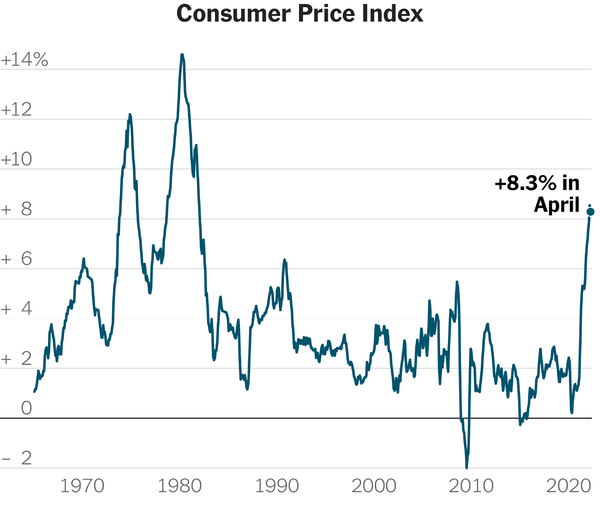
Food prices have risen 17 consecutive months. The food index was up 9.4% from one year earlier. An index for meats, poultry, fish and eggs rose 14.3 percent from the previous year, the largest annual increase since 1979. Ariane Curtis, a global economist at Capital Economics, said in a note Wednesday that the rise in agricultural commodity prices stemming from the war in Ukraine had added 0.6 percentage points to average inflation in advanced economies, but that the effect would fade in the months ahead as price increases cooled.
Agricultural prices started to skyrocket in the second half of last year, signaling year-over-year price increases will start to look less steep since they are measured from a higher starting point. The highest April increases were seen among some grocery staples such as eggs, milk, citrus fruits and margarine.
“If we break down global supply chains for food and agriculture, the food crisis will only become worse,” David W. MacLennan, the chief executive of Cargill, said at a conference hosted by the U.S. Chamber of Commerce on Tuesday. “The worst thing we can do is close down trade as it relates to food.”
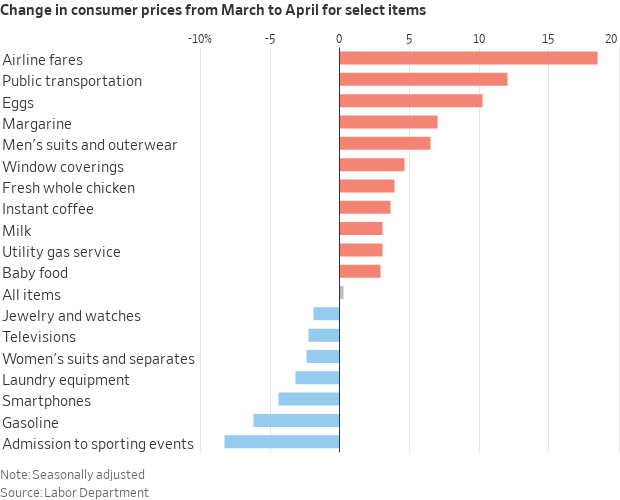
This year’s U.S. agriculture shipments are under threat and the crops aren’t even planted yet. Farmers are in a race against the clock to get their crops in the ground this week, the WSJ reports (link), with planting of corn, soybeans and wheat well behind their usual pace because of wet and cool temperatures in key parts of the Midwest and drought in other regions. Any longer delays mean farmers may start to lose out on a bigger harvest and extend a lackluster year for agriculture shipments. Grain carloads carried by U.S. railroads fell 15.2% in April and were down 9.6% through the first four months of the year, according to the Association of American Railroads. Grain traders say poor yields could send high prices for agriculture commodities rising even more, with supplies thinning as farmers world-wide grapple with tough weather.
U.S. federal government’s budget deficit has shrunk by some $1.57 trillion so far this fiscal year, driven by record receipts from a strong economy and a slowdown in spending as pandemic-era programs fade. The deficit dropped to $360 billion over the seven months from October through April 2022, according to Treasury Department data released Wednesday. The Treasury Department said gov’t revenue from taxes and other receipts for the month rose by 97% from a year earlier to $864 billion while federal outlays in April fell by 16% to $555 billion, reflecting a decline in pandemic-related spending. April’s $308 billion surplus was the largest recorded in a single month, though surplus and deficit amounts aren’t inflation adjusted.
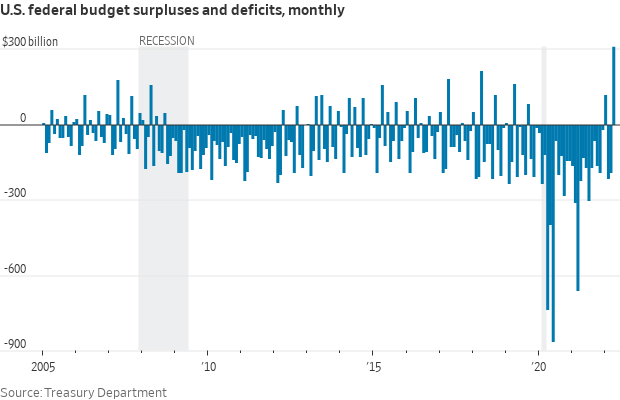
Britain’s economy grew by 0.8% in the first three months of this year, but the good news was confined to January. The economy contracted in March, by 0.1%, after flatlining in February. The official figures add to fears of a bad year ahead. On Wednesday the National Institute for Economic and Social Research, a think-tank, predicted that Britain’s GDP would fall in the third and fourth quarters of 2022 — meaning recession.
EWG report: Crop insurance premiums could skyrocket as climate change intensifies. Taxpayers delivered nearly $40 billion in crop insurance premiums in the Mississippi River region between 2001 and 2020, and that number is expected to increase sharply as climate change intensifies, according to an analysis (link) of USDA data by the Environmental Working Group (EWG) that was released Wednesday. “The federal Crop Insurance Program must be reformed to encourage farmers to adapt to a rapidly changing climate before costs spiral even more out of control,” said Anne Schechinger, EWG’s Midwest director and author of the report. The report predicts that if the climate warms by 1-degree Celsius, premium subsidies could increase 22%. With 2 degrees of warming, that increase could be 57%.
“As the USDA evaluates all of its programs for how they could better support climate adaptation and mitigation, the agency should be taking a long hard look at the Crop Insurance Program,” Schechinger said. In the 20-year period analyzed by EWG, Illinois, Iowa, Minnesota, and South Dakota received the most money in premium subsidies — more than $22.9 billion combined, or about 58% of total premium subsidies in the MRCCA — Mississippi River Critical Conservation Area, a USDA-designated “area of focus” encompassing more than 387 million acres in about 1,000 counties across 13 states.
Comments: One policy analyst emails: “EWG has been discredited so many times. Crop insurance consistently operates under budget. The FY23 budget provides $13 billion total for all commodities, including livestock and dairy. If EWG were serious about saving money from crop losses it would stop trying to block crop protection products that limit crop losses due to drought and pests. Without those products, imagine what crop insurance would cost? If EWG cared about climate, it would stop blocking these crop protection products that allow farmers to plant cover crops and to do no till farming and other things EWG should want to encourage. This cognitive dissonance of EWG is just an example of why nobody takes EWG seriously.”
Casinos just had their best month ever. The U.S. gambling industry reported a record $5.31 billion in revenue for the month of March, according to a report from the American Gaming Association. Casinos have benefited from pent-up demand from gamers eager to spend money on leisure and entertainment. And gamblers haven’t been put off from visiting casino destinations such as Las Vegas because prices for food and accommodations have risen.
Market perspectives:
• Outside markets: The U.S. dollar index is higher in early trading. The ICE U.S. Dollar Index rose 0.6% to the highest level since 2002. The index measures the greenback against a basket of other currencies. The euro fell 1.1% to $1.0398. The British pound fell 0.5% to $1.2195. The Japanese yen rose 1.1% to 128.59 per dollar. The yield on the 10-year U.S. Treasury note is fetching 2.837%. Copper dropped below $9,000 a ton for the first time since October and other metals slid on mounting worries about weak global demand. Gold futures fell 0.6% to $1,842 an ounce.
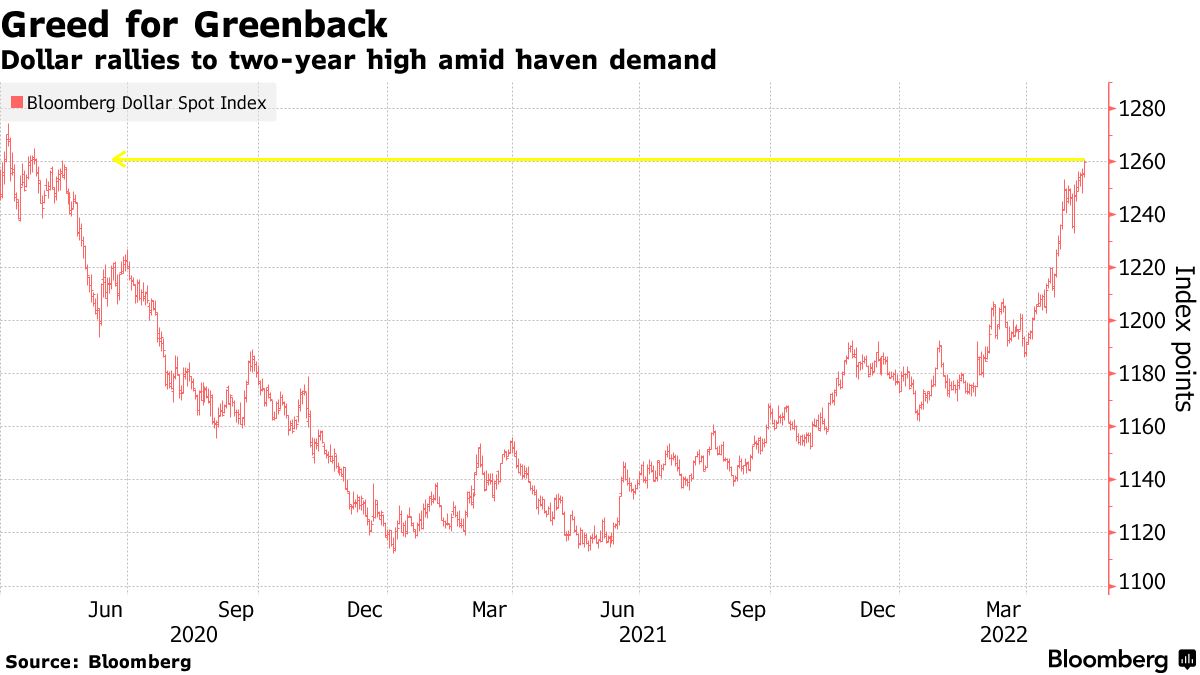
• Cryptocurrencies continued to fall early Thursday. Bitcoin plunged below $25,500 for the first time since December 2020. Stablecoin Tether broke its peg and dropped as low as $0.94 after the collapse of TerraUSD. Coinbase was also down in premarket trading. Treasury Secretary Janet Yellen called for stablecoin rules, citing the Terra meltdown. Sen. Pat Toomey (R-Pa.), a crypto champion and a ranking member of the banking committee who is drafting stablecoin legislation, said he also hoped Congress would act fast. But he added that he did not believe that algorithmic stablecoins, like UST, needed regulation because they are not tied to assets like cash, held in banks. “It does not seem to me that this introduces systemic risk,” he said. As for those who lost money, Toomey said, “It should be up to consumers — and by the way, failure should be an option.”
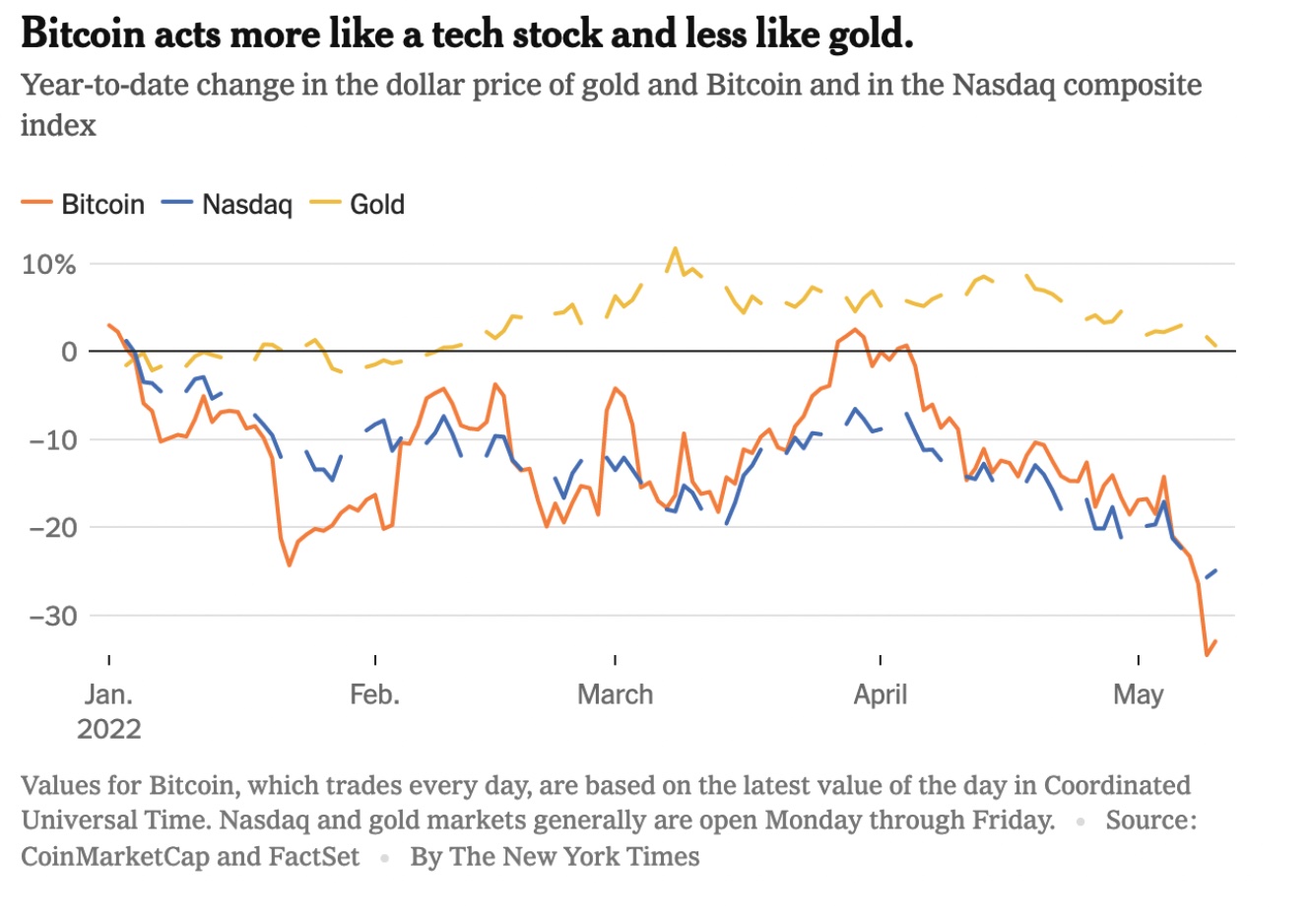
• Crude oil futures slipped after U.S. crude inventories rose more than expected. Global benchmark Brent crude fell 1.3% to trade at $106.13 a barrel. West Texas Intermediate crude fell 1.8% to $103.84 a barrel. Prices were also weighed down by slow progress on European Union negotiations to potentially ban Russian crude imports.
• Lower output from Russia due to the fallout from its invasion of Ukraine will not leave the world short of oil, the International Energy Agency (IEA) said on Thursday, as supply ramps up elsewhere and Chinese lockdowns tamp down demand. The IEA, after warning on March 16 that 3 million barrels per day (bpd) could be shut in from April, lowered that figure for a second time as it noted only 1 million bpd had gone offline. The assessment by the Paris-based agency suggests the economic impact from further sanctions on Russian energy mulled by the European Union could be limited. "Soaring pump prices and slowing economic growth are expected to significantly curb the demand recovery through the remainder of the year and into 2023," the IEA said, adding that curbs aimed at containing Covid-19 in China were driving an extended economic slowdown there. “Over time, steadily rising volumes from Middle East OPEC+ and the U.S. along with a slowdown in demand growth is expected to fend off an acute supply deficit amid a worsening Russian supply disruption,” the IEA said in its monthly oil report. IEA expects an increase in oil volumes from the Middle East countries that are members of the “OPEC +” alliance and the United States, amid falling demand due to the closures in China.
• Gas prices are hitting record highs even though crude oil has dropped. Given that 59% of gas prices come from the cost of crude, a 22% decline in oil should've translated to a 13% dip at the pump — but that didn't happen.
• In premarket trading, Beyond Meat plunged more than 25% after the meat-alternative company reported a wider-than-expected loss in the last quarter due to higher spending.
• Ag demand: Japan purchased 196,560 MT of wheat in its weekly tender, including 87,640 MT U.S., 85,580 MT Canadian and 23,340 MT Australian. Taiwan tendered to buy 65,000 MT of corn to be sourced from the U.S., Brazil, Argentina or South Africa.
• NWS weather: Rapidly developing low pressure system will bring rounds of heavy rain, severe thunderstorms and strong winds across the Upper Midwest and northern Plains through Thursday night... ...Summer-like heat from the southern Plains to the Great Lakes and northern New England will continue to challenge daily records... ...Unsettled weather to enter the Northwest as well as over the East Coast during the next couple of days... ...Another day of critical fire danger across central/southern High Plains before conditions ease on Friday.
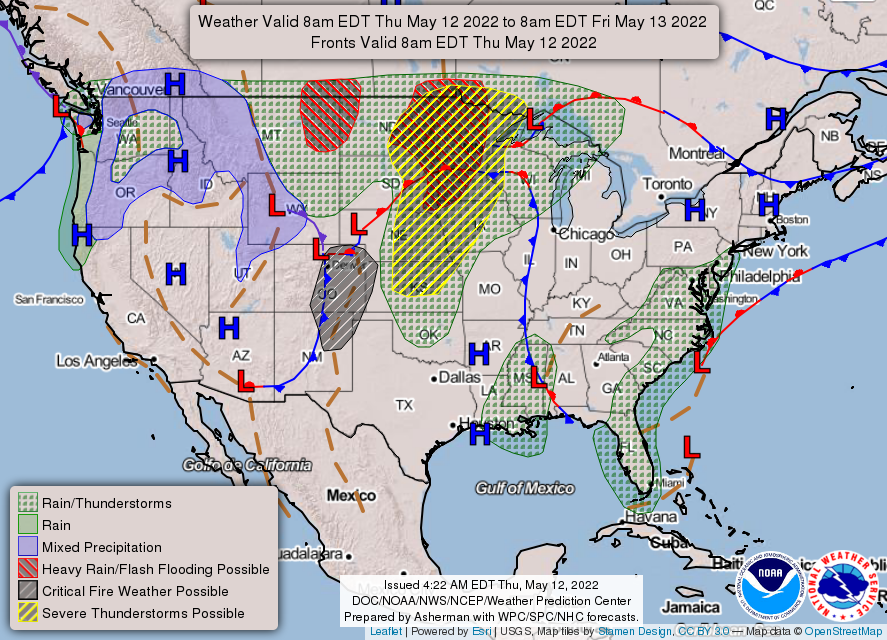
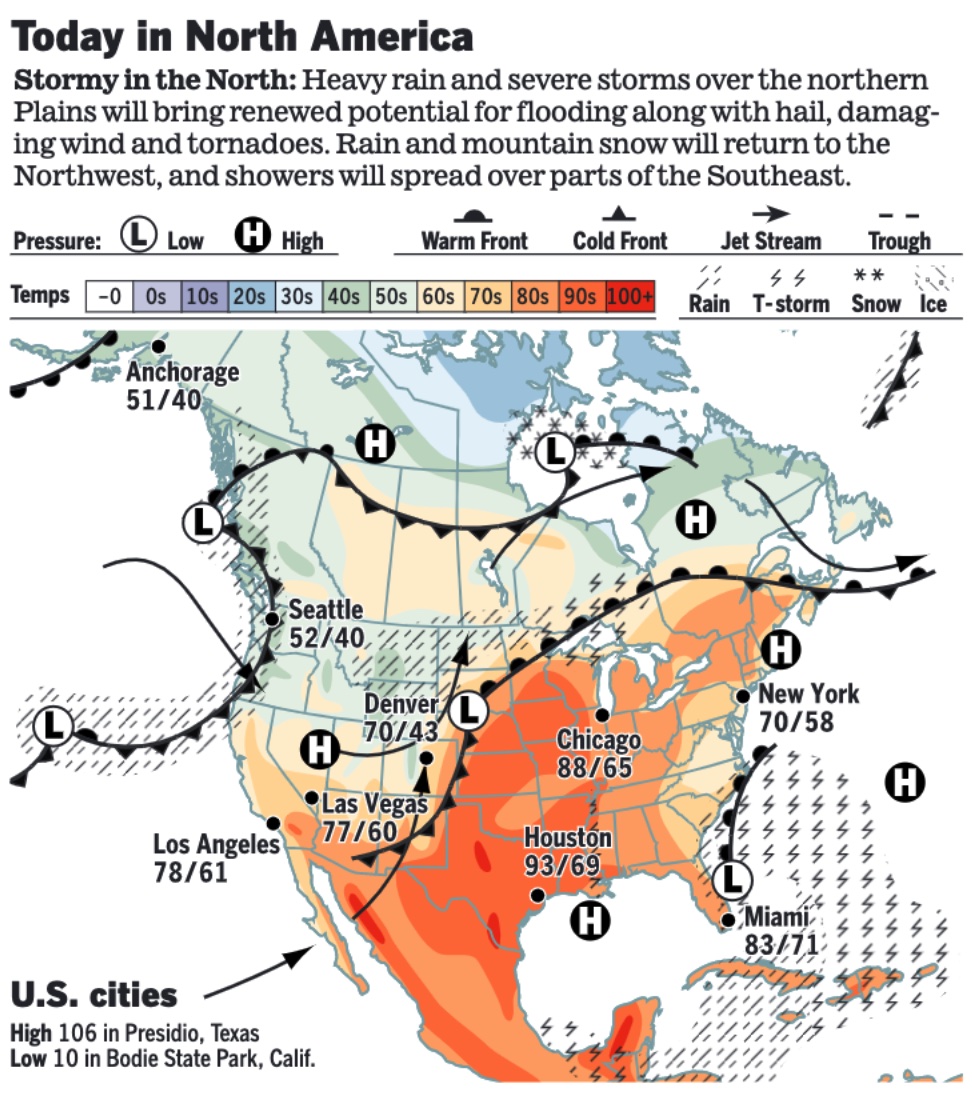
Items in Pro Farmer's First Thing Today include:
• Mostly weaker tone overnight
• China’s initial 2022-23 forecasts (see China section for details)
• Firm cuts EU wheat export forecast
• Cash cattle may trend steady/weaker
• June hogs at a discount to the cash index
|
RUSSIA/UKRAINE |
— Summary: The Ukrainian military pressed its counteroffensive against Russian troops Wednesday — pushing them back from the northeastern city of Kharkiv — in a move that observers say could propel the conflict into a new phase, as U.S. intelligence officials warned that Moscow was preparing for a protracted war.
- Russia’s Ryabkov held talks with U.S. ambassador in Moscow. Russian Deputy Foreign Minister Sergei Ryabkov held a meeting in Moscow with U.S. Ambassador to Russia John Sullivan, the Foreign Ministry said in a website statement. The talks followed a report that Kremlin-installed authorities in Ukraine’s Kherson region plan to ask to become part of Russia, a sign that the occupied territory may be annexed.
- EU again failed to agree on an embargo of Russian oil. Hungary’s leader, an ally of Vladimir Putin, blocked the effort.
- Finland's president and prime minister have announced their support for joining NATO, moving the Nordic nation -- which shares an 800-mile border with Russia —one step closer to membership of the U.S.-led military alliance. Since the end of World War II, Finland has been militarily non-aligned and neutral to avoid provoking Russia. It is also expected that Sweden, Finland's neighbor to the west, will soon announce its intention to join the alliance. Russia has warned both countries against joining NATO, saying there would be consequences.
- European Union’s top diplomat, Josep Borrell, is pushing member states to boost the amount of Ukrainian military aid the bloc will finance by 500 million euros ($522 million) to 2 billion euros, Bloomberg reports, citing people familiar with the discussions. Member states have yet to agree to the proposal regarding the European Peace Facility, with Germany the main holdout at a meeting of EU political and security ambassadors this week, said the people, who asked not to be identified because the talks are private. The European Peace Facility reimburses governments for military deliveries to Ukraine.
— Market impacts:
- Putin expects big crop, stronger grain exports. Russia will increase grain exports this year due to a good harvest, President Vladimir Putin told a government meeting on Thursday. He said the country’s grain production will reach 130 MMT, including a record 87 MMT of wheat.
- Director of the World Food Program asked for an additional $5 billion in U.S. food aid, saying warfare in Ukraine “is quickly transforming a series of already terrible hunger crises into a global food crisis” that could destabilize governments, cause mass starvation, and lead to “migration on an unprecedented scale.” Link for details.
|
POLICY UPDATE |
— Biden vows to help U.S. farmers try to ease global spike in food prices following Russia’s invasion of Ukraine. The president visited a farm Wednesday in Kankakee, Illinois (60 miles south of Chicago), and as expected, unveiled policies to increase harvests in ways that the administration believes could also help to reduce grocery bills at home. “I stand here today to thank American farmers who are the breadbasket of democracy,” Biden said. “We can make sure that American agricultural exports will make up for the gap in Ukrainian supplies.”
“You got us through a pandemic and you’re literally the backbone of our country,” Biden said, speaking after touring the farm. “That’s not hyperbole. But you’re also feeding the world. And we’re seeing with Putin’s war in Ukraine, you’re like the backbone of freedom.”
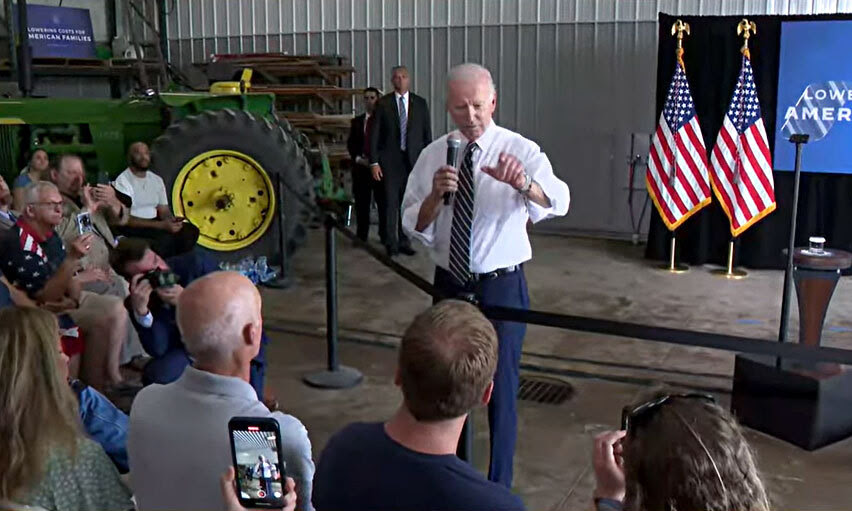
Three policy measures were announced, including doubling funding for domestic fertilizer production to $500 million, greater access to farm management tools for plant and soil needs, and efforts to increase the number of counties eligible for double cropping insurance so that farmers can reuse their land for planting in the same year. Link to White House fact sheet.
“We have to keep investing in our farmers to reduce the costs, reduce prices to consumers and have the most productive, most efficient farmers in the world here in the United States,” Biden said.
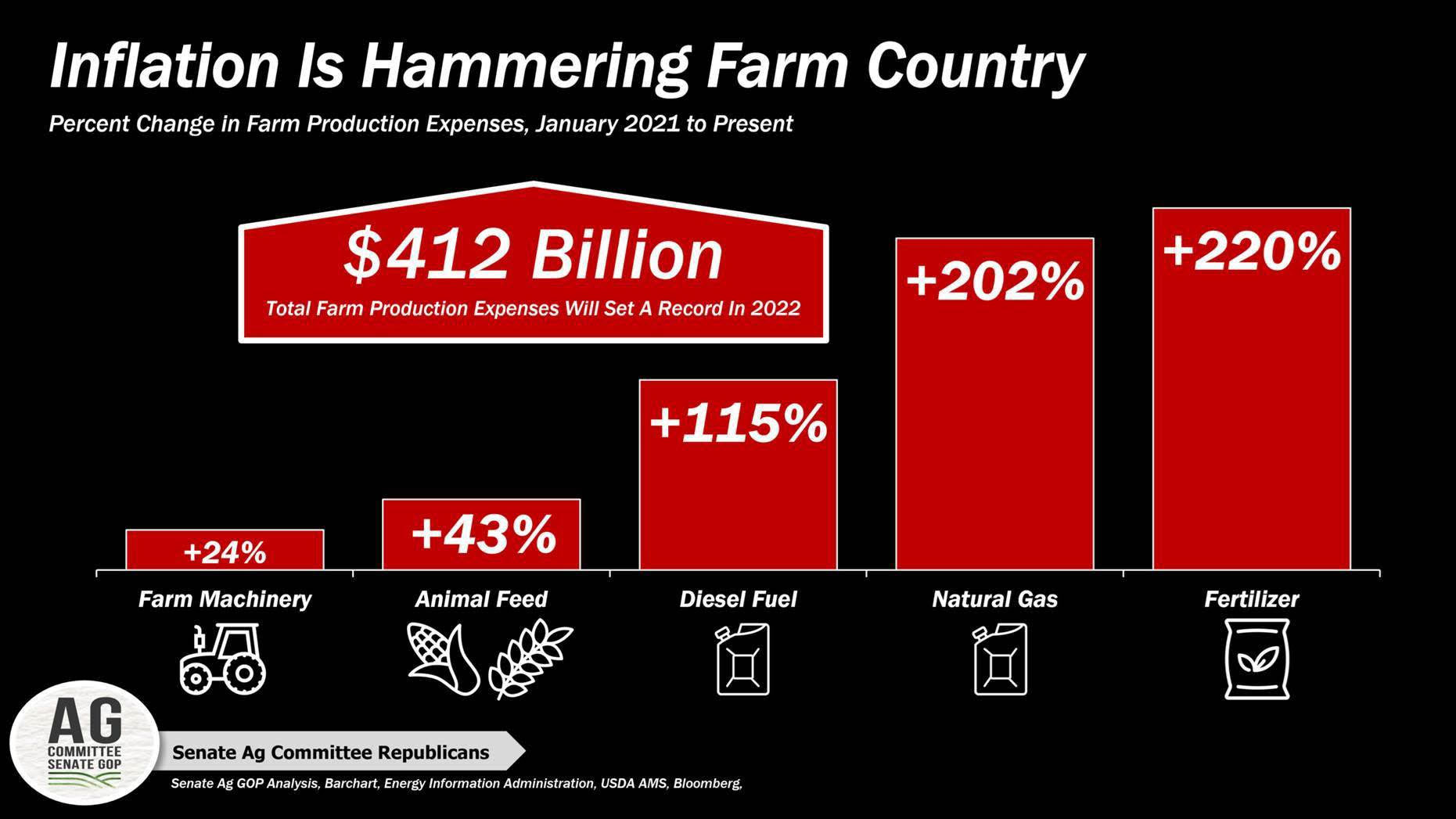
Biden noted that Ukraine has 20 million metric tons of wheat and corn in storage that the U.S. and its allies are trying to help ship out of the country. This would help to address some supply issues, though challenges could persist.
The Kankakee (IL) Daily Journal reports (link) that while “many would describe Biden as an East Coast resident with little knowledge of the world of agriculture, he noted that is simply not the case. The nation’s 46th president, who noted that his home state of Delaware has a $4-billion agriculture base business, said he is well aware of the issues facing American farmers.”
Biden toured the 800-acre O’Connor Farms in Illinois with its owners, Jeff and Gina O’Connor. They are growing wheat to be harvested in July and will later use the same land for soybeans. Biden asked to drive one of their tractors, only to be told it drives itself.
“We have the ability to raise two crops in one growing season while simultaneously providing conservation benefits,” said Jeff O’Connor. “The farming community stands ready to maximize production, which we do so well, in this time of world need.”

Photo: Andrew Harnik/AP
Growing concern over global food supplies. During a congressional hearing on Tuesday, Treasury Secretary Janet Yellen said the United States was “terribly concerned about global food supplies,” adding that 275 million people globally face starvation.
Vilsack will attend the G7 agriculture ministers meeting in Germany later this week. “They’re going to see what actions we can take to increase fertilizer suppliers globally and identify how we can work together to prevent export restrictions on food and agricultural inputs and bring more global production to market, which will stabilize prices and bring more certainty to our farmers and keep people from dying of hunger,” said Biden.
Sen. John Boozman (R-Ark.), ranking on the Senate Ag panel, said the administration “is taking a positive step in announcing some measures that will spur double-cropping of select crops this fall and into 2023.” But it could do more to bring idled land into production, he said. “The reality is it will take years for the benefits of this proposal to be realized while a food crisis ensues.”
Food prices in the U.S. are also increasing. The price of food rose 0.9% in April from the previous month, according to CPI data released on Wednesday. Grocery prices were up 10.8% over April 2021, with meat rising 13.9% and eggs up 22.6%, in part due to an outbreak of avian flu. The monthly increase was driven by a 2.5% increase in the price of dairy, a 2% increase in nonalcoholic beverages and a 10.3% increase in the cost of eggs.
Republicans blasted Biden about the latest inflation data, saying that his administration’s policies were stoking the run-up in prices. Wednesday’s data on consumer price inflation “shows the Biden administration’s runaway inflation is not contained and a slight, one-month dip downward is no cause for celebration, as Americans continue to feel the pain of broad-based and rapid price increases,” Sen. Mike Crapo, an Idaho Republican, said in a statement.
The Washington Post editorializes that on Tuesday, Biden “gave his most forceful remarks yet on inflation, telling the nation he was taking it ‘very seriously’ and considered it ‘my top domestic priority.’” He “should have said this months ago. The White House has been suffering from magical thinking on inflation, and, sadly, that continues.” Link for details.
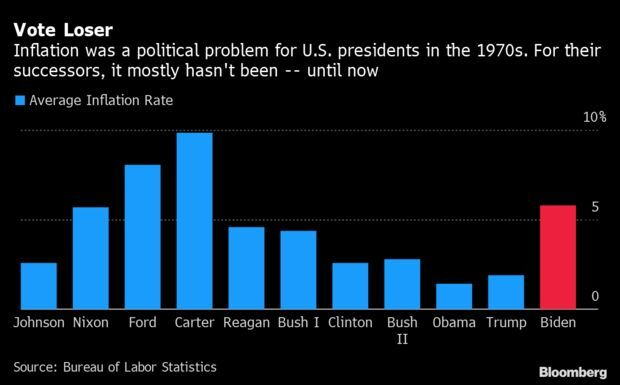
— USDA began sending Phase 1 Emergency Livestock Relief Program (ELRP) assistance to ranchers last month, with payments set at 75% of producers’ 2021 Livestock Forage Program (LFP) payment. Phase 2 will begin later this year.
USDA also will provide row crop assistance using existing crop insurance data in a two-phase approach. USDA Sec. Tom Vilsack on Tuesday said details of the $9.25 billion row crop disaster program should be released later this month, with initial payments distributed in June.
|
PERSONNEL |
— Kaptur to be newest member of House Ag Committee. Rep. Marcy Kaptur (D-Ohio) takes the place of Rep. Antonio Delgado (D-N.Y.), who is leaving Congress to become lieutenant governor of New York. She still need sto get approval from the full Democratic Caucus.
Meanwhile, on the Republican side, freshman Rep. Julia Letlow (R-La.) was selected to fill recently convicted and resigned Rep. Jeff Fortenberry’s (R-Neb.) vacant seat on the Appropriations Committee. Rep. Kevin Brady (R-Texas), the top Republican on Ways and Means, said Wednesday that he anticipates Rep. David Schweikert (R-Ariz.) would replace Rep. Tom Reed (R-N.Y.), who resigned Tuesday, as the ranking member of the panel's subcommittee on social security.
— The Senate confirmed economist Philip Jefferson as a Federal Reserve governor on Wednesday, adding a third nominee of Biden’s to the central bank’s board. The vote was 91 to 7. He was the only Biden Fed nominee to win unanimous backing from the Banking Committee.
Senate Democrats announced Wednesday night that they expect to vote today afternoon to confirm Jerome Powell to a second term as Fed chair.
Economist Lisa Cook, who was opposed by Republicans, won confirmation by the narrowest margin on Tuesday with Vice President Kamala Harris providing the tie breaking vote.
Lael Brainard was confirmed as Fed vice chair last month.
— Dallas Fed names Lorie Logan as new chief. The Federal Reserve Bank of Dallas on Wednesday named Lorie Logan as its next president, succeeding Robert Kaplan, who resigned last year following disclosures about his personal trading activity in 2020. Logan, 49, currently oversees implementation of the Fed’s monetary policy as manager of the Fed’s nearly $9 trillion securities portfolio and executive vice president of the Federal Reserve Bank of New York, where she has led Market Operations, Monitoring and Analysis since 2012. The appointment is effective Aug. 22. The Dallas Fed’s next turn to vote on monetary policy is in 2023.
— Senate confirmed Alvaro Bedoya to serve on the Federal Trade Commission by a 51-50 margin, with Vice President Kamala Harris casting the tie-breaking vote after a party-line vote. Bedoya's confirmation gives Democrats a 3-2 majority on the FTC and the ability to act on Chair Lina Khan's agenda in areas like antitrust and consumer protection. The New York Times reports (link) Amazon could be a top target for Khan and her new commissioner. Khan, who wrote a student law review article in 2017 criticizing the company’s dominance, may now have the ability to pursue a legal case against the company.
|
CHINA UPDATE |
— Sunac China Holdings Ltd. has defaulted on a dollar bond, becoming one of the biggest Chinese property companies to renege on its obligations amid a record-breaking wave of missed payments.
— The yuan extended declines as the central bank hinted at further easing. The offshore yuan touched a fresh low after a Chinese central bank official said loan rates have been guided to decline. The People’s Bank of China is making stabilizing economic growth a top priority and will step up support for weak sectors, Deputy Governor Chen Yulu said.
— China’s top political advisory body plans to host a forum next week with some of the nation’s largest private-sector firms including Baidu Inc., an event that will be closely scrutinized over whether Beijing will dial back its clampdown on the technology industry.
— China’s initial 2022-23 forecasts. China’s ag ministry expects the country’s corn acreage to decline 1.9% to 42.524 million hectares (105.1 million acres) but production is projected to hold virtually steady at 272.6 MMT due to a likely increase in yield. The ministry forecasts corn imports will fall 10% to 18 MMT in 2022-23. Soybean planted acreage is expected to rise 18.3% to 9.933 million hectares (24.5 million acres) and production is projected to increase 18.8% to 19.5 MMT. The ag ministry forecasts 2022-23 Chinese soybean imports at 95.2 MMT, up 2.4% from its estimate for this year.
— China increases soybean auction volume for this week. China will auction another 500,000 MT of state-owned soybean reserves on Friday, according to the National Grain Trade Center. It previously said 314,000 MT of state-owned reserves would be auctioned this week.
|
ENERGY & CLIMATE CHANGE |
— U.S. Commerce Dept. to defend probe that’s disrupting solar industry. Commerce Secretary Gina Raimondo plans to defend a government trade investigation that is disrupting the domestic solar market and reassure anxious lawmakers that potential tariffs imposed in the case won’t exceed 200%. Raimondo says the probe is following a set process that doesn’t allow consideration of climate change, supply chains and other factors.
— USPS ordered to backtrack on vehicle contract by House panel. The House Oversight and Reform Committee advanced legislation (H.R. 7682) by a vote of 20-15 that would send the U.S. Postal Service back to the drawing board on a plan to upgrade its trucks with mostly gasoline-powered vehicles.
— Department of the Interior canceled a high-profile oil and gas lease sale in Alaska's Cook Inlet, which would have allowed drilling in over 1 million acres, citing a "lack of industry interest in leasing in the area." The agency also canceled two other lease sales in the Gulf of Mexico region amid "conflicting court rulings," as the Biden administration nears a June deadline to complete the sales.
|
LIVESTOCK, FOOD & BEVERAGE INDUSTRY |
— Illegal migrants first to get 'pallets' of hard-to-find baby formula. According to videos posted by a Florida lawmaker, the Biden administration has been shipping “pallets” of baby formula to migrant holding facilities. “They are sending pallets, pallets of baby formula to the border,” said Republican Rep. Kat Cammack in one of two online postings yesterday. “Meanwhile, in our own district at home, we cannot find baby formula,” she added, holding a photo of empty shelves where the formula would be.
— NAMI: House subcommittee report distorts truth about meat and poultry industry’s work to protect employees during Covid-19 pandemic. The North American Meat Institute (NAMI), the nation’s trade association for meat and poultry packers and processors, today said the House Select Subcommittee on the Coronavirus Crisis’ partisan report distorts the truth about the meat and poultry industry’s work to protect employees during the Covid-19 pandemic. The following is a statement from Julie Anna Potts, President and CEO of the North American Meat Institute:
“The Meat Institute and its member companies voluntarily provided hundreds of thousands of pages to the Committee. The report ignores the rigorous and comprehensive measures companies enacted to protect employees and support their critical infrastructure workers.
“The meat and poultry industry, like many industries, was challenged by the pandemic in the spring of 2020. As more became known about the spread of the virus, the meat industry spent billions of dollars to reverse the pandemic’s trajectory, protecting meat and poultry workers while keeping food on Americans’ tables and our farm economy working.
“The House Select Committee has done the nation a disservice. The Committee could have tried to learn what the industry did to stop the spread of COVID among meat and poultry workers, reducing positive cases associated with the industry while cases were surging across the country. Instead, the Committee uses 20/20 hindsight and cherry picks data to support a narrative that is completely unrepresentative of the early days of an unprecedented national emergency.”
|
CORONAVIRUS UPDATE |
— President Biden plans to order that U.S. flags be flown at half-staff to mark 1 million deaths from the coronavirus in the United States. In a statement, he also nudged Congress to pass additional funding to combat the pandemic.
— North Korea ordered a nationwide lockdown over what it called its first Covid outbreak. North Koreans are unvaccinated.
|
POLITICS & ELECTIONS |
— Florida judge blocks part of U.S. House map that DeSantis wanted. Congressional districts for northern Florida drawn to satisfy Gov. Ron DeSantis (R) were blocked Wednesday by a state judge because they eliminated a seat where Black voters hold sway. Judge Layne Smith of the Second Judicial Circuit Court recommended replacing the current redistricting plan with a map vetoed by DeSantis for preserving Florida’s 5th Congressional District. The governor’s office described its map as neutral on race and party affiliation, and said it abided by both the state and federal constitutions. Smith said his ruling would be based on the state constitution, not the U.S. Constitution.
— Donald Trump’s company has reportedly finalized a $375 million deal to sell its lease of its Washington hotel.
|
CONGRESS |
— Senators push for vote on $25 billion WRDA bill before June. Top lawmakers on the Senate Environment and Public Works Committee are pressing leaders in both parties to bring a major bipartisan water projects bill, the Water Resources Development Act (S 4137/WRDA), to the floor before the start of the Memorial Day recess in two weeks.
— Dems defeated in abortion measure. Sen. Joe Manchin (D-W.Va.) joined every Senate Republican Wednesday afternoon in voting against advancing a bill that would forbid most state restrictions on abortion. Manchin, along with GOP Sens. Lisa Murkowski (Alaska) and Susan Collins (Maine), says he would support a less expansive bill codifying Roe v Wade. “We are not looking to compromise something as vital as this,” Senate Majority Leader Chuck Schumer (D-N.Y.) said. Democrats hope the effort will draw a sharp political contrast with Republicans.
The Democratic Congressional Campaign Committee has identified 25 front-line districts where it believes the abortion issue will be the most impactful. The districts are at least 40 percent suburban, have a large number of college educated women, women of color and colleges or universities. Of the 25 seats, five are in districts that Biden won with less than 5 points, including Reps. Elissa Slotkin (Mich.), Dan Kildee (Mich.), Tom Malinowski (N.J.), Susan Wild (Penn.) and Elaine Luria (Va.). Four are in districts Trump won by less than five points, including Reps. Cindy Axne (Iowa), Marcy Kaptur (Ohio), Matt Cartwright (Penn.), and Texas' open 15th district.
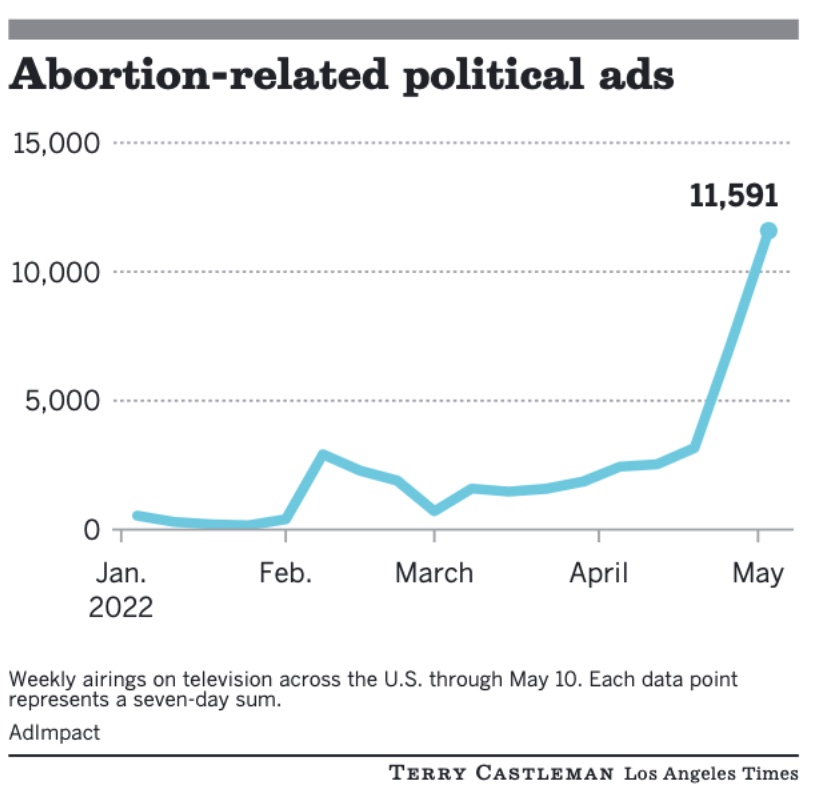
|
OTHER ITEMS OF NOTE |
— Securities and Exchange Commission is investigating Elon Musk's late disclosure of his large stake in Twitter Inc. last month, according to people familiar with the matter, as the delay could have allowed him to buy more stock without disclosing his holdings to other stakeholders. Musk has not explained why he did not file the public form within 10 days after the size of his stake made it necessary, and one expert estimated Musk saved $143 million by not reporting it until later as the share price could have been raised if the market knew of his interest in the company. Link for WSJ item for details.
— Families of the victims of the Surfside condo collapse reach a $997 million settlement. The settlement, which is pending final approval, includes insurance companies, developers of an adjacent building and other defendants in the extensive civil case. It comes weeks before the first anniversary of the deadly tragedy.
— U.S. deaths from overdoses, most of which are caused by fentanyl or meth, set another record in 2021. More than 107,000 people in the U.S. died from drug overdoses last year, preliminary Centers for Disease Control and Prevention data showed, roughly a 15% increase from 2020. The proliferation of the potent synthetic opioid fentanyl has been compounded by the destabilizing effects of the Covid-19 pandemic on users and people in recovery.
